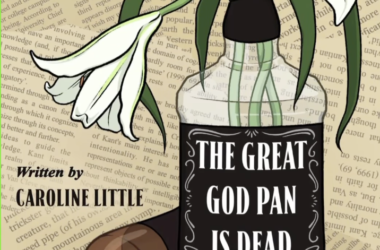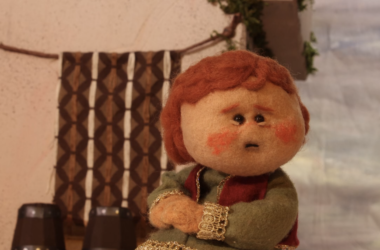Sharon Pollock’s award-winning play Blood Relations, currently showing at Moyse Hall, was directed by Professor Sean Carney and produced by the McGill Department of English. The story is a bone chilling, pulse-quickening, and thought-provoking examination of one of the most notorious cause célèbres in history.
Set in 1902, Blood Relations takes place 10 years after Borden (Sian Lathrop) was tried for the murder of her father and stepmother. Though she was acquitted, the story of her trial has become something of an urban legend in the town of Fall River, where Borden was born and raised. The entire play takes place within the Borden family estate, the ornate and lavish furnishings creating an appropriately eerie backdrop for her story to unfold.
One day, over a cup of tea one day with one of her few remaining friends—an unnamed actress from the city (played by Georgia Pearson)—Borden proposes that the two of them play a game in which she describes the days leading up to the murder, and the actress, who will assume the role of Lizzie, will act them out, in the hopes of revealing some hidden truth, and once and for all getting to the bottom of the million-dollar, decade-old question of whether or not Borden was truly guilty.
Both Lathrop and Pearson delivered spine-chilling performances while the entire cast seamlessly navigated the complex and challenging script. Visual and auditory effects were seamlessly employed throughout the play to provide a brooding, haunted atmosphere.
Blood Relations is but one of several adaptations of Borden’s story. The murder mystery has been the subject of multiple made-for-TV films, songs, novels, and even a ballet, all of which imply Borden’s guilt. Most recently, Borden was portrayed by Chloe Sevigny in the 2018 film Lizzie, which premiered on Jan. 19 at the Sundance Film Festival.
“They don’t make movies about her being innocent,” Carney said in an interview with The McGill Tribune. “People want her to be a villain.”
Indeed, the version of the story in which Lizzie Borden is guilty is almost too good not to be true. Borden was said to be abrasive and eccentric—she resented her father and despised her stepmother. She was unmarried and socially isolated. When her tie to the family estate was in danger, she appeared to have little to lose and every motive to take drastic measures to secure her right to the family home. As far as most were concerned, Borden was a lonely, aging spinster with a temper and her livelihood on the line.
But Blood Relations depicts a more nuanced Borden than is often seen in popular culture. It suggests that Lizzie was a misunderstood woman, and that she was very much alone. Lizzie had few allies and even fewer friends. She was peculiar, acerbic, and isolated.









